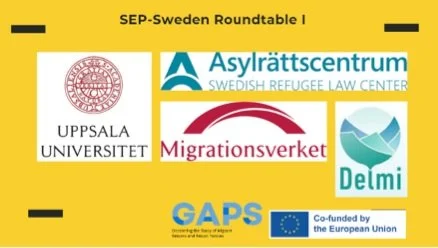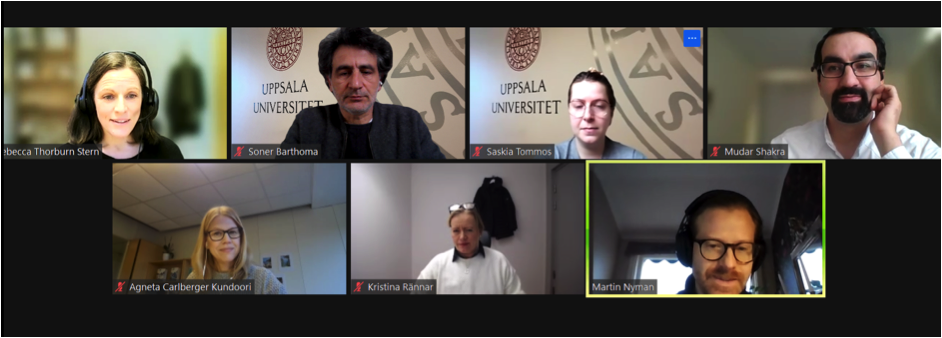Bridging Gaps: Stakeholder Perspectives on Return Operations in Sweden
In a recent roundtable panel discussion (18 December 2023) led by Professor Rebecca Thorburn Stern (Uppsala University), organized within the framework of Horizon Europe GAPs project, key stakeholders in Sweden's migration landscape shared insights and reflections on return operations in the country. The experts present were
● Martin Nyman from the Swedish Refugee Law Center;
● Agneta Carlberger Kundoori from Delmi (The Migration Study Delegation), and
● Kristina Rännar from the Swedish Migration Agency.
The purpose of the roundtable was to gather insights from stakeholders on return operations in Sweden and to receive feedback on the identified gaps as outlined in a report on the Swedish legal, political and institutional framework for return migration.
All stakeholders agreed with the depiction of the current legal and political landscape. Kristina Rännar emphasized that even though politically motivated appropriation directions changes may occur from year to year, the Migration Agency’s legal framework remains unchanged regardless of the current government. However, the Migration Agency maintains a strong focus on return which is visible mainly through resource allocation. Martin Nyman expressed concerns about the impact of legislative changes aiming at increasing returns such as revoking the right to accommodation and daily allowance after the deadline for voluntary departure has expired. Nyman believes that more can be achieved by focusing on voluntary return rather than coercive measures. He also pointed out that despite the statement “a no is always a no” is commonly heard in debates regarding rejected asylum applications, such a definitive statement cannot be applied to forward-looking assessments as the need for protection can change over time. Therefore, he suggested using the phrase “a no is almost always a no” as a more accurate catchphrase.
Agneta Carlberger Kundoori shed light on the lack of cooperation between actors in a whole-of-government approach, an issue that has been on the political agenda for a long time. Carlberger Kundoori exemplified this issue by referring to the proposed change made by a previous government, which involved the use of ‘return liaison officers’ at the Swedish Migration Agency. The purpose of such liaisons was to achieve a closer contact with other countries which initially appeared to have a positive effect. However, it was later found that the success of these liaisons was largely dependent on political engagement from government officials and politicians of the receiving country and EU partners.
The panel also explored possible reasons as to why working with return holds such a low status. Rebecca Thorburn Stern questioned whether this is partly due to discrepancies between EU and Swedish laws or not, something that Kristina Rännar questioned. Martin Nyman agreed that migration law is a complex area despite its low status. He also noted that civil society organizations are highly interested in working on returns to ensure a functioning asylum law.
A group capture of online webinar participants
Finally, the panel discussed potential changes in Swedish legislation regarding return migration and their possible impact on the effectiveness of return work. Kristina Rännar stated that the ‘track changes’ option when applying for asylum is currently a motivating factor for people to seek asylum in Sweden. The fact that the government is considering removing this option in the future and the consequences of such a change were discussed by the panel. In addition, there is also a proposal to change the statute of limitations, which aims to encourage people to leave to a greater extent as they will not have the opportunity to have their asylum application re-evaluated.
The panel discussion highlighted the importance of meticulous assessments during the enforcement stage and the necessity of effective appeals processes, particularly in situations involving practical impediments. The lack of transitional rules was identified as a significant source of uncertainty, with real-life consequences highlighted by examples of misinformation causing individuals to feel insecure in the protection they received.
The roundtable discussion provided insights into the complex landscape of return operations in Sweden. Stakeholders attending this roundtable offered diverse perspectives on the challenges, legislative nuances, and the ongoing efforts to bridge gaps within the system. These insights will contribute to a more comprehensive understanding of the Swedish legal, political and institutional framework for return migration, as the GAPs project progresses.
Contact:


